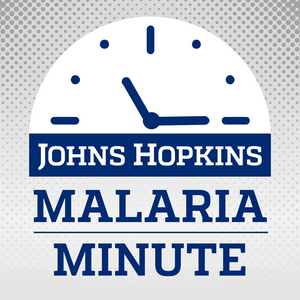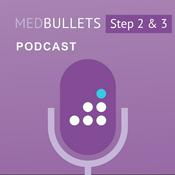103 episodios
EXTENDED: Baby Wraps and Malaria – A New Tool to Protect Young Children (with Ross Boyce)
18/11/2025 | 11 minIn sub-Saharan Africa, mothers often carry their babies on their backs in colorful cotton wraps called lesu. Could treating these wraps with insecticide help prevent malaria? Dr. Ross Boyce discusses a groundbreaking study in Uganda showing that permethrin-treated wraps significantly reduce malaria in infants – and further, what this could mean for protecting the youngest and most vulnerable children from this often fatal disease.- A new study in rural western Uganda finds that treating baby-carrying cloths, or lesu, with an insecticide with modest repellent effect significantly reduces malaria infections in young children.
Transcript
In many parts of sub-Saharan Africa, mothers carry their young children on their backs in colorful cotton wraps called lesu. Could treating these cloths with insecticide reduce malaria transmission?
A study published in the New England Journal of Medicine explored this question in rural western Uganda, where malaria is transmitted year-round. Researchers enrolled 400 mothers with children aged six to 18 months.
Using a blinded randomized placebo-controlled trial design, half received lesu treated with permethrin, a commonly-used insecticide. The other half received untreated cloths. All participants also received insecticide-treated bed nets.
Every two weeks for 24 weeks, the mothers and children visited local health centers to check for fever and undergo malaria testing. The results were striking: children carried in permethrin-treated lesu represented 66% fewer malaria cases – 0.73 cases per 100 people compared with 2.13 in the control group.
The findings suggest that insecticide-treated lesu – much like treated bed nets – could offer an effective new tool particuarly against outdoor biting for a highly vulnerable population - children under 5 years of age - in sub-Saharan Africa.
Source
Permethrin-Treated Baby Wraps for the Prevention of Malaria [NEJM]
About The Podcast
The Johns Hopkins Malaria Minute podcast is produced by the Johns Hopkins Malaria Research Institute to highlight impactful malaria research and to share it with the global community. - Too much can kill the mosquito — too little can also kill it. But the right amount can strengthen the mosquito's defenses and stop malaria transmission. Today, the Goldilocks dose. Emma Camacho shares how a natural compound called L-DOPA strengthens mosquitoes' defenses at just the right concentration, revealing a new way to block malaria transmission.
- Feeding mosquitoes L-DOPA can either strengthen their defences against malaria or shorten their lifespan — showing that in vector control, the dose makes the difference
Transcript
As with all medicine, the dose determines whether something helps or harms.
Researchers recently looked at a substance commonly found in mosquito habitats that might form part of their diet. It's called L-3-4-dihydroxyphenylalanine, or L-DOPA. Mosquitoes use it as a source of melanin.
At low doses – up to a concentration of 2% – L-DOPA was toxic to mosquitoes and reduced the number of malaria parasites they carry in a dose-dependent manner. At higher doses, toxicity was stronger and the mosquitoes' rates of survival decreased, demonstrating what's known as a biphasic dose response.
These findings offer two potential strategies for L-DOPA in malaria control. Low doses fed to mosquitoes in water could improve their defences against the parasite, thereby reducing onward transmission to humans. Higher doses could be used to kill mosquitoes or reduce their life span, particularly if used in a sugar bait.
These strategies align with the need for cost-effective, sustainable and eco-friendly vector control methods. For L-DOPA, it all comes down to the dose.
Source
Dietary L-3,4-dihydroxyphenylalanine (L-DOPA) augments cuticular melanization in Anopheles mosquitos reducing their lifespan and malaria burden
About The Podcast
The Johns Hopkins Malaria Minute podcast is produced by the Johns Hopkins Malaria Research Institute to highlight impactful malaria research and to share it with the global community. - How do you turn vast amounts of genetic data into actionable insight – efficiently and accurately? Professor Bryan Greenhouse of UCSF discusses a series of "hackathons" at the Johns Hopkins Malaria Research Institute (JHMRI) that bring together scientists from around the world to tackle one of the biggest challenges in malaria research: analyzing parasite genetics. By developing open-source tools, workflows, and training resources, these collaborations are making cutting-edge analysis more accessible to labs and public health programs everywhere.
Más podcasts de Ciencias
Podcasts a la moda de Ciencias
Acerca de Johns Hopkins Malaria Minute
Impactful malaria science, and the trailblazers leading the fight. A podcast from the Johns Hopkins Malaria Research Institute.
Sitio web del podcastEscucha Johns Hopkins Malaria Minute, Jefillysh: Ciencia Simplificada y muchos más podcasts de todo el mundo con la aplicación de radio.net

Descarga la app gratuita: radio.net
- Añadir radios y podcasts a favoritos
- Transmisión por Wi-Fi y Bluetooth
- Carplay & Android Auto compatible
- Muchas otras funciones de la app
Descarga la app gratuita: radio.net
- Añadir radios y podcasts a favoritos
- Transmisión por Wi-Fi y Bluetooth
- Carplay & Android Auto compatible
- Muchas otras funciones de la app


Johns Hopkins Malaria Minute
Escanea el código,
Descarga la app,
Escucha.
Descarga la app,
Escucha.


































